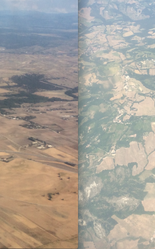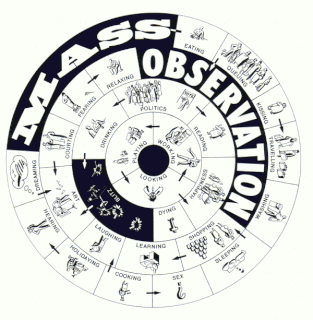Workshop and Travel Update: Thinking About Households, Consumption and Environment in the Twentieth Century in Italy with the Rachel Carson Center
 A contrast in countrysides: outside Madrid and outside Bologna
A contrast in countrysides: outside Madrid and outside Bologna
This May 30 and 31, I was lucky enough to be one of twelve invited participants at a workshop sponsored by the Rachel Carson Center for Environment and Society entitled "Household Consumption and Environmental Change in the Twentieth Century."
Over the course of two days, the twelve participants engaged in panel presentations, lively discussion, and great eating, guided by the two workshop conveners: Giacomo Parrinello of the Paris Institute for Political Studies and Paolo Capuzzo of our host institution, the University of Bologna. The conversations they sparked began with some of the most pressing questions for historians and modern-day policy writers alike. To quote the conference webpage:
Consumption is a crucial dimension of present-day environmental debates. From meat to automobiles, from tourism to electronic gadgets, multiple dimensions of individual and group consumption are questioned from the perspective of their impact on the environment and their share of responsibility in the global ecological crisis. How this relationship has been built, both discursively and in its material underpinnings, throughout history? While consumption studies have shed light on the subjective and often political dimension of consumer culture, environmental history has emphasized the material outcomes. We think that only by combining these two historical perspectives it is possible to fully understand the contradictory place of consumption in present-day environmental debates and politics.
Personal Workshop Highlights:

First, the panel I presented on was incredible. I found myself of being in the curious position of talking about trash compactors while other panelists talked about gardens!
Michelle Mart's probing exploration of local food in the American late twentieth century included an examination the historical legacy of Victory Gardens and their impact on contemporary valuations of 'local food,' much to my delight -- I cannot wait to read the book that comes out of her research.
Elisa Tizzoni, on the other hand, traced ideas of sustainability through women's food magazines in Italian history -- a lens that rounds out more mainstream gender, labor, and domesticity analyses of women's popular periodicals!
Daniel Philippon, with his meditation on "Kitchens of the Great Anthropocene" also used tools of literary analysis to pose questions about sustainability, but centering on the kitchen and the act of preparing food. This paper reminded me anew that good analysis is made breathtaking when paired with thoughtful, literary writing -- not hidden by it!
I contributed to the conversation by sharing an object biography of what I present as a technological failure: the residential trash compactor. While the reasons for its failure are myriad (issues of repair, energy use, smell, creation of heavier trips taking garbage out to the sidewalk, etc.), more interesting to me are the reasons for its invention and early popularity. I think that the life of the trash compactor reveals a complicated story about American's relationship to their own generation of household waste -- and the various ways they grappled with guilt about the act of disposal.
 The design speaks as much as the content of this amazing image!
The design speaks as much as the content of this amazing image! Finally, two papers made novel uses of unusual sources for telling their histories, affecting my thoughts about methodology and ways of telling stories about the past. First, Rebecca Wright opened my eyes to the amazing environment/consumption history research possibilities -- and problems! -- within the Mass Observation Archive. The archive was generated by sociological observations of British life starting in 1937 and truly, you should read read more about this massively strange and wonderful phenomenon.
On the other hand, Nina Möllers from the Deutsches Museum of Munich, Germany, presented an analysis of museum exhibits that made meaning out of the silences therein; she argued the environment was an 'invisible issue' in exhibits on energy and the home. I love critical examinations of museum practices as a growing genre of historical writing and this paper gave me a new way to think about how I might be able to use such evidence in innovative ways.
Final Takeaways:
 Venice!
Venice! I think this workshop drew attention to the tensions between individual, structural, institutional, and natural agency in ways that would enrich the work of any historian -- or any policy-maker in our twenty-first century halls of government. These conversations will surely inform my own work for years to come.
I must end on a note of gratitude to the Rachel Carson Center for sponsoring this wonderful workshop, to Giacomo and Paulo for organizing it, and to all my fellow participants for sharing their wonderful work, explaining an aperol spritz to me, and giving me fantastic feedback for how to move my project forward. Let's do it again sometime!


 RSS Feed
RSS Feed